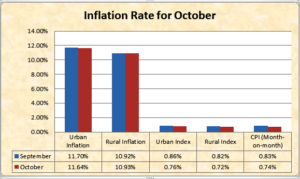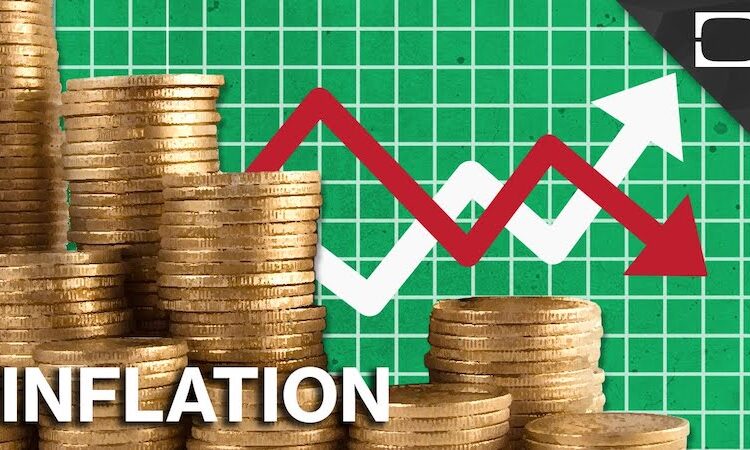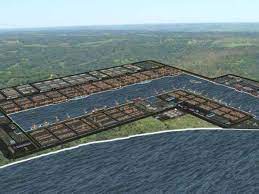
The National Bureau of Statistics (NBS) yesterday said for the first time in the last eight months, inflation rate rose to 15.63 per cent in December 2021 from 15.40 per cent in November.
It increased by 1.82 per cent, according to NBS’s “Consumer Price Index December 2021 Report.”
The Bureau said: “The Consumer Price Index, (CPI), which measures inflation, increased by 15.63 per cent (year-on-year) in December 2021.
This is 0.13 per cent points lower than the rate recorded in December 2020 (15.75) percent.”
The document explained that this is showing slowing down in the rate when compared to the corresponding period of 2020.
Increases were recorded in all Classification of Individual Consumption by Purpose (COICOP) divisions that yielded the Headline index, said NBS.
It noted that “On month-on-month basis, the Headline index increased by 1.82 per cent in December 2021; this is 0.74 per cent rate higher than the rate recorded in November 2021 (1.08) percent.”
The Bureau said the percentage change in the average composite CPI for the twelve-month period ending December 2021 increased by 16.95 per cent, from 16.98 per cent over the average of the CPI for the previous twelve-month period recorded in November 2021, down by 0.03 percent points.
According to the document, urban inflation rate increased by 16.17 per cent (year-on-year) in December 2021, from 16.33 per cent recorded in December 2020, while the rural inflation rate increased by 15.11 per cent in December 2021 from 15.20 per cent in December 2020.
On a month-on-month basis, the urban index rose by 1.87 per cent in December 2021, up by 0.75 the rate recorded in November 2021 (1.12) per cent, while the rural index also rose by 1.77 per cent in December 2021, up by 0.73 the rate that was recorded in November 2021 (1.04) per cent.
NBS said the twelve-month year-on-year average percentage change for the urban index is 17.52 per cent in December 2021.
This, it said, is lower than the rate reported in November 17.55 (per cent), while the corresponding twelve month (month-on-month) average percentage change for rural index inflation rate in December 2021 stood at 16.40 per cent, from 16.42 per cent in November 2021.
On food, the Bureau said “the composite food sub-index rose by 17.37 per cent in December 2021, down by 2.19 per cent points when compared to 19.56 per cent in December 2020.
“This rise in the food sub-index was caused by increases in prices of bread and cereals, food product, meat, fish, potatoes, yam and other tuber, soft drinks and fruit.
“On month-on-month basis, the food sub-index increased by 2.19 per cent in December 2021, up by 1.12 per cent points from 1.07 per cent recorded in November 2021.
“The average annual rate of change of the food sub-index for the twelve-month period ending December 2021 over the previous twelve-month average was 20.40 per cent, 0.22 percent points lower from the average annual rate of change recorded in November 2021 (20.62) percent.”
The document noted that in December 2021, all items inflation on year on year basis was highest in Ebonyi (18.71%), Kogi (18.37%) and Bauchi (17.81%), while Kwara (12.32, Edo (13.46%) and Cross River (13.93%) recorded the slowest rise in headline Year on Year inflation.
NBS said on month-on-month basis, the highest increases was recorded in Ebonyi (4.01%), River (3.41%) and Taraba (3.28%), while Jigawa (0.56%) recorded the slowest rise with Cross River and Kaduna recording price deflation or negative inflation (general decrease in the price level).
The document added that in December 2021, food inflation on a year-on-year basis was highest in Kogi, (22.82%), Enugu (20.65%) and Lagos (20.27%), while Edo (13.24%), Kaduna (13.53%) and Sokoto (14.82%) recorded the slowest rise.
It added that on month-on-month basis, December 2021 food inflation was highest in Cross River (4.09%), Akwa Ibom (3.88%) and Rivers (3.79%), while Nasarawa (0.21%) , Jigawa (0.39%) recorded the slowest rise in inflation on month-on-month with Kaduna recording price deflation or negative inflation (general decrease in the price level of food or a negative food inflation rate).
Commenting on the report, Economist/CEO, Centre for the Promotion of Private Enterprise (CPPE), Dr Muda Yusuf, said inflationary pressures remain a significant macro-economic risk in the economy.
He said it is a major concern to both businesses and the citizens as food inflation, which is the biggest worry for the poor, rose from 17.21 per cent in November to 17.37 per cent in December.
Yusuf observed that the core inflation, which relates to non-agricultural products, maintained an upward trend as it increased from 13.85 per cent in November to 13.87 per cent in December. This was largely a reflection of the impact of currency depreciation and the liquidity challenges in the forex market.














